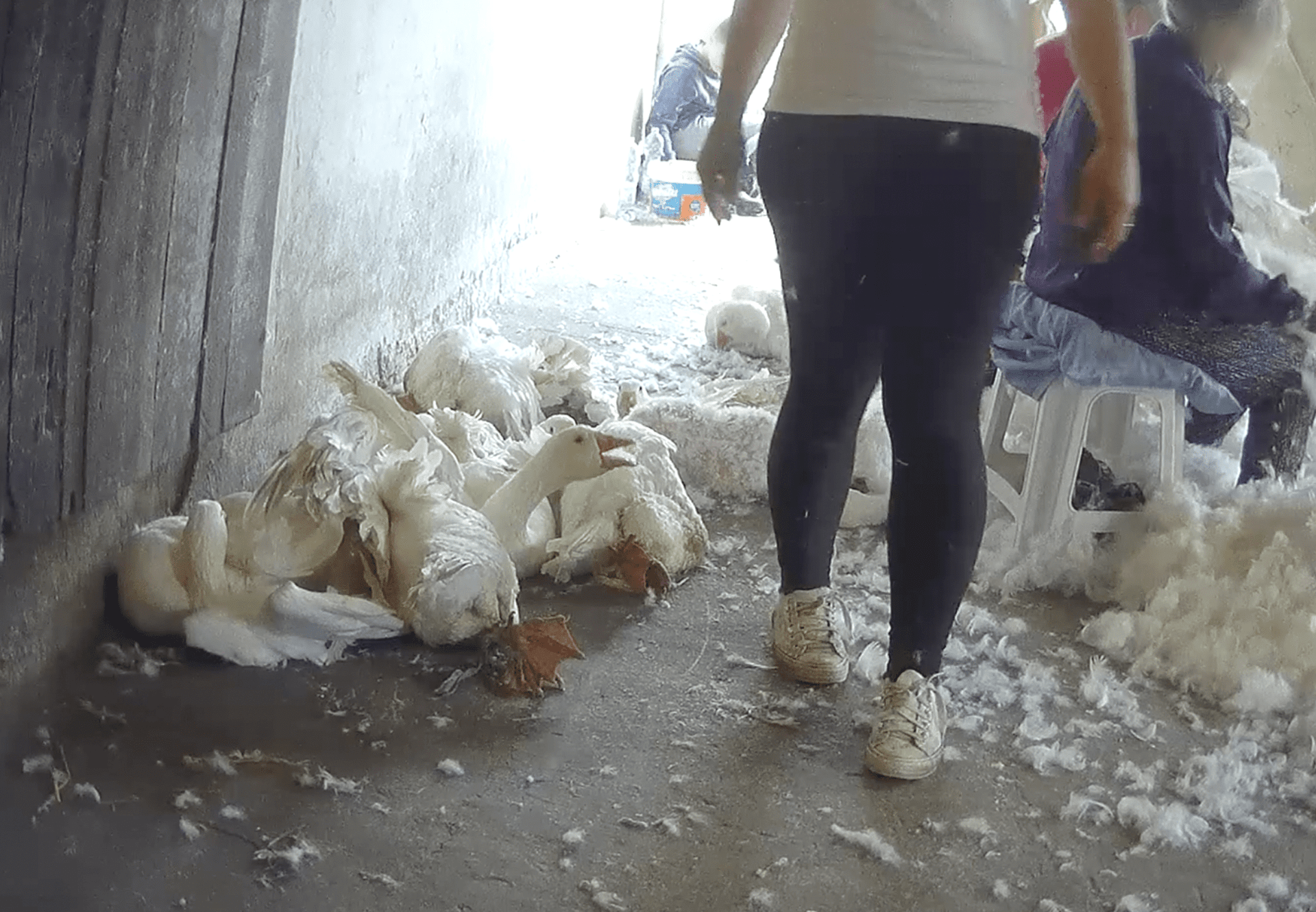
Cruel Live Plucking of Geese Still Common in Poland
FOUR PAWS reveals animal welfare violations on almost half of investigated farms
Vienna, 2 November 2022 – New video footage from global animal welfare organisation FOUR PAWS shows brutal scenes of geese being plucked alive on several farms across Poland. The painful procedure of plucking feathers and down from live geese is forbidden in the EU. However, gathering feathers during natural molting cycles is allowed, making it a profitable loophole for geese farmers and fashion brands that may not have committed to standards prohibiting live plucking in their supply chains such as Prada, Max Mara or Michael Kors.
Some brands, such as H&M, Patagonia and The North Face, however, are spearheading animal friendly developments by implementing certain animal welfare standards or switching to animal-free alternatives. FOUR PAWS urges fashion brands to take action and ensure their down supply chain is free from live plucking, and ideally transition to animal-free alternatives.
As winter approaches, many customers around the world will choose down jackets for their daily wardrobe without knowing about the underlying animal welfare problems. Statistics show, that only five per cent of the globally manufactured down and feathers are sourced responsibly.
Violent scenes of geese cruelty shared with and by FOUR PAWS, show that of 35 visited farms across Poland, almost half of them were reportedly forcibly removing down from live geese.
Global market is worth hundreds of millions USD
It is estimated that the global down and feather production volume was around 532,528 tonnes in 2020 with China being the largest export country, producing 70 per cent ($566M) of the global supply. Taiwan comes in second with an export volume worth 165 million USD. Poland is the third largest exporter of down and feather exports with a value of 73.8 million USD worth of material in 2020. United States ($72.8M) and Germany ($67.7M) come in inglorious places four and five of the global ranking in down exports.
“Consumers can help by choosing products filled with equally warm animal-free alternatives, or at the very least looking for certified down products. However, it’s important to note here, that parent farms are often not included within the scope of certified products, so it’s vital to ask brands and product manufacturers if they can ensure the entire down supply chain is free from live plucking”, Medcalf says.
Take action, show the fashion world that you care about animals and pledge to Wear it Kind!
Background
Many birds used for down come from the foie gras industry, where at around eight weeks of age, they are force-fed with metal tubes forced down their throats to pump their stomachs full of food – far exceeding what they could eat naturally. This process is repeated multiple times a day and causes the birds’ livers to swell up to ten times their natural size and can cause organ failure, injuries to the birds’ beaks and throats, and pneumonia. Due to the brutality of the feeding, many birds die during or after the procedure. Those who survive can hardly move because of their corpulent bodies.
Environmental concerns
Intensification of the poultry industry has led to multiple environmental impacts. Slaughterhouses release enormous amounts of waste into the environment, polluting land and surface waters as well as posing a serious human-health risk. Poultry co-products and waste may contain up to 100 distinct species of micro-organisms, including pathogens, in contaminated feathers, feet, and intestinal contents. Antibiotics, pesticides, and hormones leaked into waterways are found highly likely to have long-term ecosystem effects.

FOUR PAWS on Social Media
Stay up to date on this topic and on all FOUR PAWS activities on our social media channels:
or subscribe to FOUR PAWS International newsletter.
FOUR PAWS is the global animal welfare organisation for animals under direct human influence, which reveals suffering, rescues animals in need and protects them. Founded in 1988 in Vienna by Heli Dungler and friends, the organisation advocates for a world where humans treat animals with respect, empathy and understanding. The sustainable campaigns and projects of FOUR PAWS focus on companion animals including stray dogs and cats, farm animals and wild animals – such as bears, big cats and orangutans – kept in inappropriate conditions as well as in disaster and conflict zones. With offices in Australia, Austria, Belgium, Bulgaria, Cambodia, France, Germany, Kosovo, the Netherlands, Switzerland, South Africa, Thailand, Ukraine, the UK, the USA and Vietnam as well as 13 wild animal sanctuaries and cooperation projects across the globe, FOUR PAWS provides rapid help and long-term solutions. www.four-paws.org

